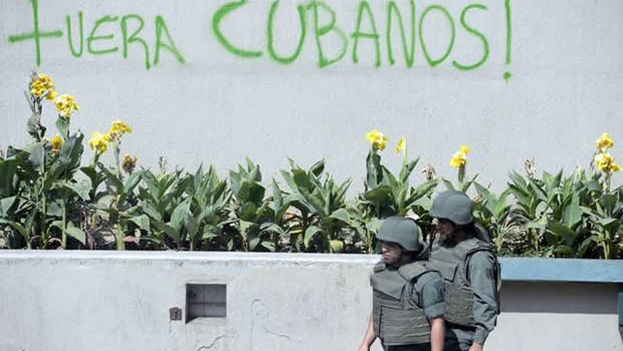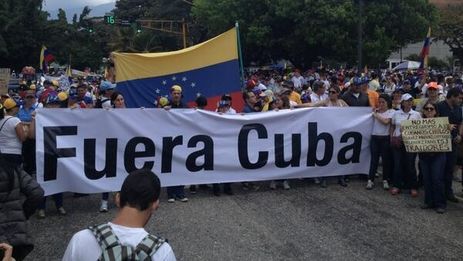
![]() 14ymedio, Mario Penton, Miami, 18 May 2017 — Seen from the Venezuelan opposition as an army of occupation and from the Venezuelan government as soldiers of socialism, tens of thousands of Cuban professionals live a situation that is complicated day after day in convulsive Venezuela. The Cuban government has asked them to stay “until the last moment,” but misery, fear and violence are overwhelming athletes, doctors and engineers.
14ymedio, Mario Penton, Miami, 18 May 2017 — Seen from the Venezuelan opposition as an army of occupation and from the Venezuelan government as soldiers of socialism, tens of thousands of Cuban professionals live a situation that is complicated day after day in convulsive Venezuela. The Cuban government has asked them to stay “until the last moment,” but misery, fear and violence are overwhelming athletes, doctors and engineers.
“We are not soldiers and we did not come to Venezuela to put a rifle on our shoulders,” says a Cuban doctor from the state of Anzoátegui who asked for anonymity for fear of reprisals.
According to the physician, who has been working for two years in the country, Havana has asked them to remain “with honor until the last moment,” in a clear allusion to the possible fall of the Venezuelan government.
“We are working under a lot of pressure because the Medical Mission is adept at continuing to insist that services not be closed and that we maintain our position here in spite of everything,” he adds.
“We are afraid every day about what could happens to us. Sometimes they throw stones at us or they yell all kinds of insults at us. Every day there are demonstrations in front of the medical unit and nobody protects us”
In Venezuela there are about 28,000 health workers and thousands of others who are sports instructors, engineers, agricultural technicians and even electricians. The model of paying for Cuban professional services through the export of oil to Cuba has never been clearly exposed by the Venezuelan government.
According to Nicolás Maduro, since Chavez came to power, more than 250 billion dollars have been invested in the so-called “missions.” The former Minister of Economy of the Island, José Luis Rodríguez, published last April that Cuba received 11.5 billion dollars a year in payment for professional services rendered abroad, most of which comes from Venezuela. Other sources consider, however, that this is a very inflated number, although Havana’s profits are undoubtedly very high.
“We are afraid every day about what could happens to us. Sometimes they throw stones at us at the CDI [Centro de Diagnóstico Integral, doctor’s offices] or they yell all kinds of insults at us. Every day there are demonstrations in front of the medical unit and nobody protects us,” explains the doctor.
“So far they only attack us with words. They shout at us to get out of here, that they do not want to see themselves like us and other atrocities,” he adds.
The doctor, however, assures that those who work in the missions also do not want to be in that situation, but they are forced by the Cuban Government, that exerts pressure through diverse mechanisms.
“If we leave, we lose the frozen accounts maintained for us in Cuba. Also, if you leave the mission you are frowned upon in the health system and you have no possibility of being promoted,” he explains.
The Cuban government deposits $200 a month in a frozen account that at the end of the three years the mission lasts in Venezuela, totals $7,200. If the professional maintained “proper conduct and did their duty,” they can withdraw that money upon their return to the island. If they return before the established period or their participation in the mission is revoked (among other reasons for attempting to escape) they lose all that money.
In Cuba 250 dollars a month are deposited that can be withdrawn when the professional on the mission visits the Island once a year. Meanwhile, in Venezuela, they receive 27,000 bolivars, less than 10 dollars a month.
“If we leave, we lose the frozen accounts maintained for us in Cuba. Also, if you leave the mission you are frowned upon in the health system and you have no possibility of being promoted”
In the case of health technicians, Cuba pays them 180 dollars in a current account and another 180 dollars a month in an account frozen until the end of the mission.
A Cuban radiologist who is in the Venezuelan state of Zulia explains that for months they have no “Mercal,” a bag of food delivered by the Government of Venezuela.
“We live in overcrowded conditions with several colleagues and we do not even have potable water,” he adds.
“Thanks to some patients we can eat, but they are having a very bad time. We are repeating something like the Special Period that we experienced in Cuba,” he says.
Although he fears for his life because of the situation in the country, he says he is determined not to return to the island. “We have to endure until the end. It is not fair to lose everything after so much sacrifice,” he says.

Following the outbreak of the protests in Venezuela, Cuban aid workers have been directed not to leave their homes and have experienced reduced communications with their families in Cuba.
Following the outbreak of the protests in Venezuela, Cuban aid workers have been directed not to leave their homes and have experienced reduced communications with their families in Cuba
“The internet is very bad, you can not even communicate. We have been forbidden to go out after six o’clock in the afternoon, as if we were slave labor, and on television they broadcast news that has nothing to do with what we are living through,” he explains.
Julio César Alfonso, president of Solidarity Without Borders, a Miami-based nonprofit organization that helps Cuban health personnel integrate into the US system, says the exodus of professionals has increased in recent weeks.
“Even without the US Medical Professional Parole Program, which allowed doctors to obtain refuge in the United States, they continue to escape because of the situation in Venezuela,” said the physician.
Alfonso added that his organization is lobbying to re-establish the Parole Program, eliminated by former President Barack Obama in January, and allowing more than 8,000 Cuban professionals to enter the United States.
Eddy Gómez is an critical care doctor who worked in the state of Cojedes in western Venezuela. He decided to escape because he was afraid of the difficult conditions in which he was forced to work.
“We had to work in dirty places, without air conditioning, exposed to the fact that even the patients insulted us because we nothing to treat them with,” recalls the doctor who now lives in Bogota and acts as spokesperson for dozens of other professionals who escaped medical missions.
“We left Cuba looking for a better life, but in Venezuela we discovered a real hell”
“After the end of Medical Parole program people have continued to escape and come to Colombia. There are more than 50 professionals who left Venezuela after President Obama’s decision to eliminate it. We hope that Trump will admit doctors again,” says Gómez.
To escape Venezuela, the Cubans have to pay the coyotes about $650 to take them to Colombia. The path, full of dangers, includes a bribe to Venezuela’s Bolivarian National Guard that protects the borders, and to whom they must be careful not to show their official passports issued to them by the Cuban government because they would immediately be deported to the Island.
“There are many Cubans who have died violently in Venezuela, but the Cuban government does not tell the truth to their families, nor does it pay them compensation,” explains the doctor.
“We left Cuba looking for a better life, but in Venezuela we discovered a real hell.”
